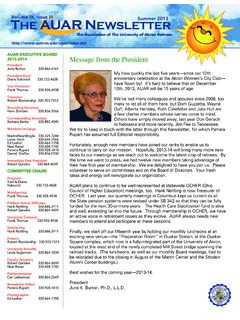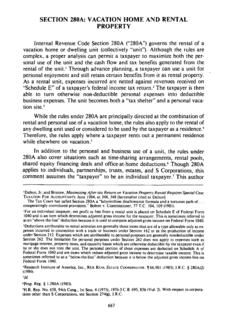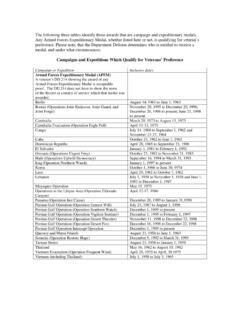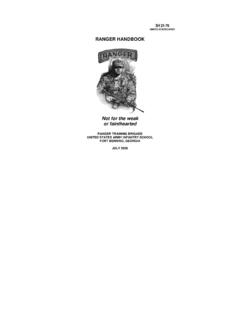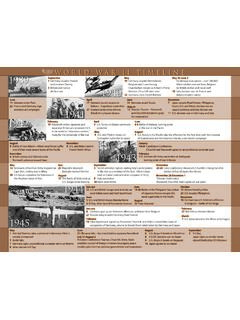Transcription of ARMY LEADERSHIP— CHARACTER
1 Leadership Track Section 2. army LEADERSHIP . CHARACTER . Key Points 1 Seven Core army Values 2 Empathy 3 Warrior Ethos 4 CHARACTER Development e God grant that men of principle shall be our principal men. Thomas Jefferson army Leadership CHARACTER 17. Introduction The old wisdom is that an army runs on its stomach. But the physical well-being and values ultimate success of an army in the field depends far more on the CHARACTER of its leaders. Quality leadership grows out of sound values and attributes. Such leadership the central ideas that instills trust, confidence, and loyalty in your subordinates and produces results.
2 The form the foundation of essential values and attributes of CHARACTER discussed here will be the moral compass your CHARACTER and guide your decision on your journey to becoming a respected, effective leader. making and behavior Our values are never tested more strenuously than during times of crisis. Those who can keep a level head and act with CHARACTER , particularly in the face of grave danger, testify to the importance of the army Values and leader attributes. Consider CHARACTER how one army leader in Vietnam reacted with integrity and heroism in a combat who you are, defined by situation.
3 Your values, beliefs, and behavior Incident at My Lai On March 16, 1968, Warrant Officer (WO1) Hugh C. Thompson, Jr., and his two- man crew were on a reconnaissance mission over the village of My Lai, Republic of Vietnam. WO1 Thompson watched in horror as he saw an American Soldier shoot an injured Vietnamese child. Minutes later, when he observed American Soldiers advancing on a number of civilians in a ditch, WO1 Thompson landed his helicopter and questioned a young officer about what was happening on the ground. Told that the ground action was none of his business, WO1 Thompson took off and continued to circle the area.
4 When it became apparent that the American Soldiers were now firing on civilians, WO1 Thompson landed his helicopter between the Soldiers and a group of 10 villagers who were headed for a homemade bomb shelter. He ordered his gunner to train his weapon on the approaching American Soldiers and to fire if necessary. Then he personally coaxed the civilians out of the shelter and airlifted them to safety. WO1 Thompson's radio reports of what was happening were instrumental in bringing about the cease-fire order that saved the lives of more civilians. His willingness to place himself in physical danger in order to do the morally right thing is a sterling example of personal courage.
5 E Critical Thinking How did WO1 Thompson exhibit CHARACTER at My Lai? What was at stake for Thompson? Can you infer anything about the difference between the CHARACTER of Thompson and that of the young officer he questioned? 18 SECTION 2. Seven Core army Values You enter the army with your personal values developed in childhood and nurtured over many years of personal experience. By taking an oath to serve the nation and the institution, you also agree to live and act by a new set of values army Values. army Values consist of the principles, standards, and qualities considered essential for successful army leaders.
6 They are fundamental to helping you make the right decision in any situation. army Values firmly bind all army members into a fellowship dedicated to serving the nation and the army . They apply to everyone, in every situation, anywhere in the army . The trust Soldiers have for each other, and the trust the American people have in you, all depend on how well you embody the army Values. The army recognizes seven values that must be developed in all army individuals. The first letters form the acronym LDRSHIP : Loyalty Duty Respect Selfless service Honor Integrity Personal courage. Loyalty Bear true faith and allegiance to the US Constitution, the army , your unit, and other Soldiers.
7 All Soldiers and government civilians swear a sacred oath to support and defend the Constitution of the United States. The Constitution established the legal basis for the existence of our army . As a logical consequence, you have an obligation to be faithful to the army and its people. e Loyalty is the big thing, the greatest battle asset of all. But no man ever wins the loyalty of troops by preaching loyalty. It is given him by them as he proves his possession of the other virtues. BG S. L. A. Marshall Men Against Fire (1947). e There is a great deal of talk about loyalty from the bottom to the top.
8 Loyalty from the top down is even more necessary and much less prevalent. GEN George S. Patton War As I Knew It (1947). army Leadership CHARACTER 19. Loyalty is a two-way commitment between leaders and subordinates. The loyalty of subordinates is a gift given when a leader deserves it. Leaders earn subordinates' loyalty by training them well, treating them fairly, and living the army Values. Leaders who are loyal to their subordinates never let Soldiers be misused or abused. Subordinates who believe in their leaders will stand with them no matter how difficult the situation. Few examples better illustrate loyalty to country, the army , its people, and self better than that of World War II GEN Jonathan Wainwright.
9 Loyal in War and in Captivity The Japanese invaded the Philippines in December 1941. In March 1942, GEN. Douglas MacArthur left his Philippine command and evacuated to Australia. Although GEN MacArthur intended to stay in command from Australia, GEN. Jonathan Wainwright, a tall, thin and loyal general officer assumed full command from the Malinta Tunnel on Corregidor, while MG Edward King replaced Wainwright as commander of the American Forces and Filipino Scouts defending Bataan. Soon, the Japanese grip on the islands tightened and the Philippine defenders at Bataan were surrounded and without any support other than artillery fire from Corregidor.
10 Disease, exhaustion, and malnutrition ultimately accomplished what thousands of Japanese soldiers had not done for 90 days . Bataan was lost. When Bataan fell to the Japanese, more than 12,000 Filipino Scouts and 17,000 Americans became prisoners. On the initial march to Camp O'Donnell, the Japanese beheaded many who became too weak to continue the trip. Other prisoners were used for bayonet practice or pushed to their deaths from cliffs. The situation at Corregidor was no better. Soldiers were weary, wounded, malnourished, and diseased. GEN Wainwright directed the defenses with the limited resources available.
